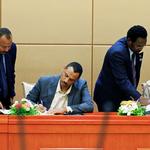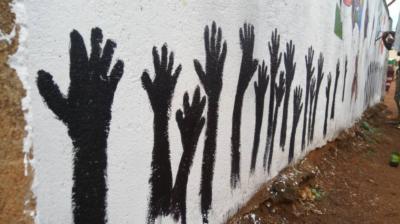Sexual violence does not stop Sudan's women from speaking up
The Sudanese regime's brutal military forces tried to scare female protesters away from the streets. Sexual harassment and abuse were well-known weapons.
For nearly half a year, peaceful protesters occupied Sudan's streets in protest against the autocrats who ruled the country with an iron fist for 30 years. The vast majority of protesters were women. The Islamist security police have used sexual harassment and abuse as a strategic means to push female protesters away from the streets and back home "where they belong".
This patriarchal attitude has become even more clear as women have been continuously excluded from the negotiations between the Transitional Military Council and the Forces for Declaration of Freedom and Change. When the two parties brokered a deal last month, only one woman was represented. Only two women were appointed to the Sovereign Council that will run the country during a three-year transitional period leading up to democratic elections.
The true face of the regime
President Omar al-Bashir was forced to leave April 6, but his supporters are still in power and represented in the Sovereign Council. These forces emphatically showed their true face on June 3 when armed forces attacked the peaceful sit-in outside the military headquarters in Khartoum. Over 100 people were killed, and far more seriously injured. More peaceful protesters were killed during the 30rd of June million march in the country.
Several women, particularly younger ones, have expressed fears that the security forces would use sexual violence against the protesters since the inception of the popular uprising. These fears came true on the 3rd of June as the Islamists security police and Rapid Support Forces (RSF) – a paramilitary unit that grew out of the Janjaweed militia responsible for atrocities in Darfur – allegedly committed dozens of rapes. Doctors from the Central Committee of Sudanese Doctors, which is part of the umbrella Sudanese Professionals Association, told reporters that 70 rape cases, mostly women and few men, were recorded by Khartoum hospitals in the immediate aftermath of what has been called the Ramadan massacre. This information about the rapes came out despite restrictions on communication immediately after the atrocities. The extent of sexual violence is still unknown even months after internet and mobile services have been restored.
A burning desire for change
Young and older women from all over the country, with different religious, class and ethnic backgrounds, have participated in the demonstrations. What they have in common is a burning desire for change. The regime's military forces have met them with tear gas, bullets, violence and abuse.
In addition to sexual abuse, female protesters have been met with other types of gender-based violence. The Islamist-military state in Sudan has made hijab mandatory and public order police have punished women who have dressed ‘indecent’ and ‘immodest’ with whipping, fines or imprisonment. The Criminal Code of 1991 mandates ‘decent’ clothing and behavior of both men and women. But during the demonstrations, the Rapid Support Forces and Islamists security officers have torn the hijab off women’s heads and cut the hair of women. “Although women wear proper clothes, they are exposed to verbal abuse and physical violence, and this they [the abusers] do with Islam as their cover,” said one out of 64 female protesters that we interviewed.
The aim is to frighten female protesters and force them back home. Removing the hijab is a direct threat to female protesters that other parts of their bodies are at risk of abuse and sexual harassment.
Removing the hijab is a direct threat to female protesters that other parts of their bodies are at risk of abuse and sexual harassment.
Fighting for freedom at home and in the streets
The very real possibility of being sexually harassed and abused has added an extra dimension of fear for the female protesters and their families. We have interviewed 64 female protesters. Several of them say they have participated without their family's blessing and that they also participated secretly. Women with and without hijab or face-covering niqab, university students and housewives told similar stories:
That they participated despite their families banning them to do so.
A widely spread video in social media shows the back of a woman talking behind the closed door of her house. But from behind the door she drew attention of some protesters in the neighborhood and explained how her husband refused her participation in demonstrations. She participated in chanting behind the door.
Through various bargaining strategies, women have been able to confront cultural attitudes within their families. A 27-year woman university graduate said: “My mother resisted my participation so without her knowledge I participated in afternoon demonstrations and came back home early. But I confronted her when I had to work with youth group in the neighborhood in the evening. She insisted to go with me the first day for dispatching publications with slogans. With my persistence, she gave me (…) permission to participate”.
Through various bargaining strategies, women have been able to confront cultural attitudes within their families.
A forty-year university graduated housewife said in a similar vein: “My husband thought that demonstrations and sit-in are for men and women are to be in the house. Despite that I agreed with women in the neighborhood and we all succeeded to participate in the daily demonstrations in the neighborhood. As the sit-in space is far away from home, I confronted my husband with my decision to continue participation and I did, disregarding his tension”.
These are two of many female protesters who have had to negotiate and use different strategies to undermine the family's decision; a decision often based on fear. In Sudan one should not just marry and have children but should also be a virgin when you marry, and especially unmarried young women are vulnerable. Being raped by the military forces will destroy not only for the woman herself, but also her family. It is about breaking down dignity and honor. The Rapid Support Forces and Islamist security forces have repeatedly told female protesters that they will "destroy their reputation".
The fact that depictions of sexual abuse against women started circulating in social media immediately after the Ramadan massacre, despite restrictions on communication, testifies to a conscious strategy. The aim is to get the group that has been in the majority and led the demonstrations away from the streets, and the warning to Sudan's families is clear: Keep your women at home where they belong!
A social revolution?
The strategy to scare female protesters has failed. Instead, Sudanese are starting to embrace survivors of sexual abuse telling them that they are brave, whole, respected, honourable and strong; that the brutal harm the military forces have inflicted on them does not define them. Sudanese have marched in support of survivors of sexual abuse and demanded justice on their behalf. A woman activist we interviewed made the demand clear: “We need justice, transparency and independent investigation of the Ramadan massacre, especially the victimization and inhuman treatment of women during the revolution”
In the context of a conservative society, this is significant. Sexual violence has long been a taboo topic and a source of shame for survivors who are likely to be regarded as broken, unhonourable, and unfit for marriage. Survivors seldom report such incidents to the police. Partly because the lack of legal protection within the law, but also because of the social stigma. Blame is often put on the women, even by police and judges in court, because she walked alone during the night or wore indecent clothing or somehow tempted her rapist to rape her. There is a very real risk that the survivor of rape will be prosecuted for gross indecency or fornication/adultery, rather than the perpetrator being sent away to jail.
Now survivors of sexual violence during the Ramadan massacre are met with social support and demands for justice. This is nothing less than the start of a social revolution.
This Sudan Blog post is written by Samia al-Nagar, independent researcher and activist, Sudan, and Liv Tønnessen, research director at CMI
Liv Tønnessen









